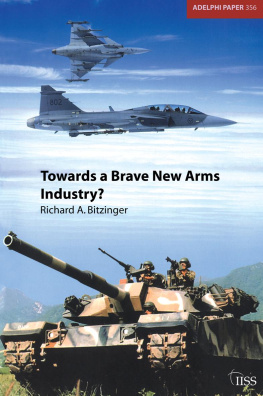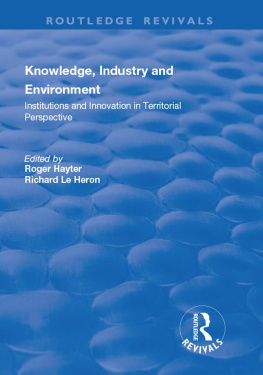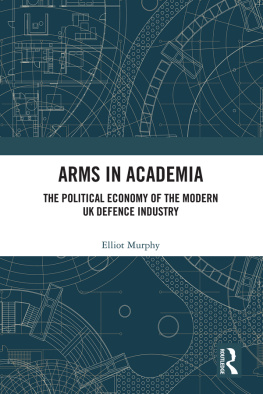First published 2003
by Oxford University Press for the International Institute for Strategic Studies, Arundel House, 13-15 Arundel Street, Temple Place, London, WC2R 3DX
This reprint published by Routledge
2 Park Square, Milton Park, Abingdon, Oxon, OX14 4RN
For The International Institute for Strategic Studies
Arundel House, 13-15 Arundel Street, Temple Place, London, WC2R 3DX
www.iiss.org
Simultaneously published in the USA and Canada
by Routledge
270 Madison Ave., New York, NY 10016
Transferred to Digital Printing 2009
Routledge is an imprint of the Taylor & Francis Group
2003 The International Institute for Strategic Studies
Director John Chipman
Editor Tim Huxley
Copy Editor Glen Quatermain
Production Shirley Nicholls, Simon Nevitt
All rights reserved. No part of this book may be reprinted or reproduced or utilised in any form or by any electronic, mechanical, or other means, now known or hereafter invented, including photocopying and recording, or in any information storage or retrieval system, without permission in writing from the publishers.
British Library Cataloguing in Publication data
A catalogue record for this book is available from the British Library
Library of Congress Cataloguing in Publication data
ISBN 0-19-852835-3
ISSN 0567-932X
Publisher's Note
The publisher has gone to great lengths to ensure the quality of this reprint but points out that some imperfections in the original may be apparent.
The past decade has not been kind to the global arms industry. The end of the Cold War has resulted in a new international dynamic military, political and economic that has forced a severe retrenchment in defence industries among the major arms-producing countries. Despite the persistence of regional conflicts around the world, many of them involving the major powers, tensions in other parts of the globe have abated considerably, and with them has gone much of the need for large defence budgets and sizeable armed forces. As much of the world has disarmed and demilitarised, so too the demands and budgets for new weapon systems have declined. To put it bluntly, the end of the Cold War has left the world with considerably more capacity and capability to develop and produce arms than it either needs or can afford.
The impact on the global arms industry has been undeniable. Among the large advanced arms-producing countries the US, the UK and France, for instance hundreds of thousands of defence workers have been made redundant as military factories have cut back production, or even closed. The industry has undergone an unprecedented restructuring, both on a national and a global scale. The number of major defence firms has declined dramatically as companies have either merged or purchased the military assets of other corporations leaving the defence business. During the 1990s, these mergers and acquisitions also began to cross national boundaries, as the emerging defence giants sought new partners and subsidiaries. Another by-product of the drop in domestic demand for arms has been the growing importance of exports as a source of compensatory revenues. The effects of these developments are still being felt; governments are wrestling with their implications for national security, domestic economic growth and development, and international relations.
However much the larger arms-producing states have been pummelled by these developments, the long-term viability of these countries' defence industries is not in doubt. Firms may contract, merge or globalise, and governments may be compelled to internationalise their arms procurement, but the large arms-producing countries are unlikely to lose their across-the-board capabilities. The same cannot, however, be said for the smaller, 'second-tier' countries. For them, the issue is not simply one of dealing with reduced demand and excess capacity, but increasingly of survival. In other words, can these lesser arms-producing states endure in an increasingly competitive and globalised arms marketplace, and if so, how?
This paper addresses the current dilemmas and likely future facing these so-called second-tier arms-producing states. By examining the experiences and reactions of a cross-section of these producers, the paper examines several issues. How have post-Cold War military, economic and technological challenges specifically affected these countries? How are secondary arms producers reacting to these challenges? Which strategies have been successful and which have not, and what are the lessons for other second-tier and aspiring arms producers? Finally, given unfolding trends and developments worldwide, what might the structure and character of the global arms industry look like 10-15 years from now?
While it has long been accepted that the global arms industry is hierarchical, Moreover, they dominate either singularly or collectively the global defence research and development (R&D) process. Third-tier states are those possessing limited and generally low-technology arms-production capabilities, such as Egypt, Mexico and Nigeria.
The second-tier arms producers comprise a diverse group of countries falling between these two categories. It includes industrialised countries possessing small but often quite sophisticated defence industries, such as Australia, Canada, the Czech Republic, Norway, Japan and Sweden. It also contains a number of developing or newly industrialised countries with modest military-industrial complexes, such as Argentina, Brazil, Indonesia, Iran, Israel, Singapore, South Africa, South Korea, Taiwan and Turkey. Finally, the second tier includes China and India states with large, broad-based defence industries, but which still lack the independent R&D and industrial capacities to develop and produce highly sophisticated conventional arms.
Despite being a rather catholic group, second-tier countries share a number of growing challenges to their arms industries as the political-military arguments for home-grown defence industries weaken, and as the economic and technological barriers to domestic arms production rise. The main thrust of this paper is that second-tier arms producers are being forced to rethink radically and recast their defence industries. For many, this means cancelling more ambitious indigenous programmes, and drastically retrenching and reorienting their arms industries. In addition, it means accepting a more integrated but subordinate role in an increasingly globalised and interdependent defence industry. Structurally, such a system could resemble a huge 'hub-and-spoke' model: a few large first-tier firms at the core, serving as 'centres of excellence' for weapons design, development and systems integration, with global supply chains extending out to second-tier states on the periphery. As a consequence of this rationalisation/globalisation process, a radically different global arms industry could be emerging, with profound consequences for proliferation and arms control.
While participation in such a global division of labour may bring new economic and technological benefits to many second-tier producers, it will also demand that they abandon their original objectives of autarky, or self-sufficiency, in arms development and manufacturing. For some countries, this will be a difficult adjustment. On the other hand, should they choose not to rationalise and globalise their defence industries, these countries will face the much more difficult challenge with no assurance of success of securing additional resources, technologies and markets in order to sustain local production.








